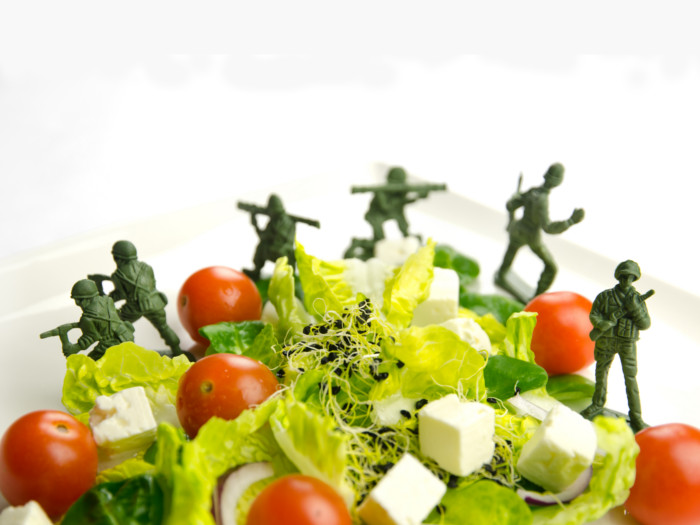Going on a military diet can be a rapid way to lose weight in a short amount of time if you do it in a healthy way!
What is the Military Diet?
The military diet is a challenging calorie-restriction diet that is used to achieve quick weight loss. This diet is broken up into two phases within each week, 3 days of calorie restriction followed by 4 days of healthy eating. This diet goes by a number of different names, including the army diet and navy diet. You will follow this dietary pattern for as long as you need until you achieve your desired weight loss. However, using this diet for more than a month is generally not recommended, as you will be operating on a calorie deficit nearly half the time. [1]
There are very strict rules on what foods you can eat, but the key is the overall calorie intake.
On the 4 “recovery” days of moderate calorie intake, you should still eat lean meats, vegetables, fruits, legumes, and natural foods if you want the diet to be effective. It is possible to use the military diet if you are a vegetarian, but there is a higher risk of nutrient deficiency, so a shorter amount of time using the diet is recommended. Don’t forget that this is a “crash” diet, so the weight loss will be some combination of fat mass, water, and muscle mass. When you stop this diet, it can be very easy to gain the weight back.

A military diet uses calorie-restriction for weight loss. Photo Credit: Shutterstock
How Does the Military Diet Work?
- For the first three days of the week, you will restrict your calories to 800-1,100 per day, following a carefully controlled diet, which does include some processed foods.
- For the following four days, you can consume roughly 1,500 calories, but it should generally be healthy food and should avoid most processed, refined, junk, and fast foods. You can repeat this two-phase pattern until you lose the weight you want. When it comes to beverages, you can drink coffee, herbal tea, and water. There are claims that you can lose up to 10 pounds in a single week on this diet, although that extreme level of weight loss can be dangerous.
Most experts, however, recommend that this type of crash diet can be dangerous, and should not be followed for too long. Those who have pre-existing conditions or are on certain medications should speak to their doctor before trying this diet. [2]
3-Day Military Diet Plan
Day 1
- Breakfast: One slice of toast with peanut butter; 1/2 grapefruit; a cup of coffee or tea
- Lunch: One slice of toast; 1/2 cup of tuna; black coffee or tea
- Dinner: 3 ounces of meat; 1/2 banana; 1 apple; 1 cup of greens beans; 1 cup of vanilla ice cream
Day 2
- Breakfast: 1 slice of toast; 1 banana; 1 cooked egg
- Lunch: 1 egg; five saltine crackers; 1 cup of cottage cheese
- Dinner: 2 hot dogs (no bun); 1/2 banana; 1 cup of broccoli; 1 cup of vanilla ice cream
Day 3
- Breakfast: 1 slice of cheddar cheese; 1 apple; five Saltine crackers
- Lunch: 1 slice of toast; 1 cooked egg
- Dinner: 1 cup of tuna; 1/2 banana; 1 cup of vanilla ice cream
Day 4-7
- Eat approximately 1,500 calories per day, trying to avoid too many unhealthy fats or processed foods.
Benefits of the Military Diet
The potential benefits of the military diet include controlling hunger, losing weight, and boosting the metabolism, among others.
Weight Loss
The reason most people try this diet is to lose weight more rapidly since this diet does create such an extreme calorie deficit. While it is possible to lose 3-5 pounds per week on this diet, losing large amounts of weight very quickly can have disastrous side effects. [3]
Hunger
Since there is a decent amount of protein in this diet, it should be able to curb hunger pangs, which will surely be an issue during the three calorie-restriction days. [4]
Metabolism
When you deprive the body of calories, it does learn to store and use energy more efficiently, but this is a short-term diet, and some of these metabolic effects will not continue once the diet ends.
Side Effects
There are some key problems with the military diet as well, including the high level of processed foods and the dangers of nutrient deficiencies, among others.
- Processed Foods: While depriving your body of calories, you are also eating a number of processed foods, and those that are high in sodium and sugar; this isn’t typically included in a healthy diet plan.
- Starvation Mode: When your body lacks the calories it needs to function properly, it can go into starvation mode, characterized by your body reducing the number of calories it burns, which means that weight loss slows down. [5]
- Long-Term Benefits: This diet is not sustainable, meaning that doing it for more than a month is dangerous and ineffective. A good diet should be something you can follow in a healthy way in the future. [6]
